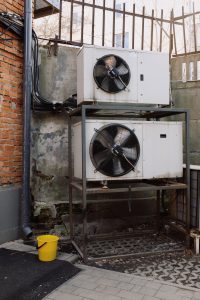If there’s one thing that can really wreak havoc on your business property, it’s water. Flooding, heavy rains that come with hurricanes, and burst pipes can all cause serious damage and cost you a lot of money in repairs and lost income. In fact, water damage is the second most common commercial insurance claim type, with an average claim amount of $17,000. But unfortunately, your problems might not be over after the flood waters have receded or after the burst pipe has been repaired. You might be left with a lingering, less noticeable form of damage: mold. Even if you have a solid commercial property policy, you might end up having to foot the bill for this common issue.
Why Is Mold a Problem?
How do you get mold on your property? For most businesses, a mold problem becomes apparent after a water damage-related event, such as flooding. But there doesn’t need to be a catastrophic event that sets off the growth of this fungus. All mold really needs to thrive is four basic things: food, heat, moisture, and oxygen. If mold spores are carried by the wind into your property, and they find an environment with these necessities, they will begin to grow.
Once mold starts to grow somewhere in your workplace, it can really do a lot of damage. Mold clean-up can cost anywhere from $500 on the very lowest end of the scale to $15,000 or even up to $30,000. Having an issue with mold is so problematic because it can grow on virtually any surface, including wood, drywall, paper, and carpet, but will often grow in places that aren’t immediately visible. That means that you might have a problem with mold before you even notice anything. And the real problem? Mold feeds on the material it’s growing on, and could eventually destroy it. In addition, while mold is probably not “toxic” to humans as some fear, it can cause health problems in some after long exposure, which could lead to liability claims from employees or others who spend time in your workplace.

Is Mold Covered by Commercial Property Insurance?
The bad news is that most standard commercial property insurance policies do not cover mold damage. Most have “fungus exclusions,” which specifically rule out coverage for loss or damage caused by: any fungus (including mold and mildew), spores, bacteria, dry or wet rot, toxins, scents, or by-products produced or released by fungi. That fairly exhaustive list means that if, for example, you have a leaking pipe that you were unaware of until you finally notice that your drywall is getting moldy and rotting, you will have to pay for the damage yourself, even if you have commercial property insurance that covers water damage.
There are a few exceptions to the mold exclusion. It does not apply to:
- Fungus, mold, dry rot, etc that results from fire or lightning
- A “specified cause of loss” that results from fungus. This means that if mold causes damage from something that is covered by your policy, then that damage will be covered. This, however, is unlikely to help much, as fungus is not very likely to actually cause things like wind damage, water damage, or vandalism.
What Can You Do?
Your first line of defense against mold is taking all possible measures to prevent it. Remember, mold can’t grow in a dry environment, so take the following steps to reduce your chances of developing a mold problem, as recommended by the Occupational Safety and Health Administration (OSHA):
- Regularly inspect the outside of your building, checking all the vents, seals, and drainage areas, and clean up any excess moisture.

Have your ventilation systems, ducts, etc regularly inspected. - Try to reduce moisture in your workplace by using a dehumidifier or increasing ventilation, and always repair any leaks you find.
- Have your ventilation systems, ducts, etc regularly inspected.
- If you do see mold, clean it up and check for more. Call a professional if you think you’ve got a problem.
Even if you’re very diligent about trying to keep mold at bay, you could still end up with it, especially if your business is in a flood-prone area. While standard commercial insurance property policies don’t usually cover mold, you can purchase an “endorsement” or “rider” to your policy known as Limited Fungus Coverage. With this type of coverage, as long as you take all reasonable measures to save and preserve your property before and after the damage occurs, you will be covered for fungus damage, cleanup, and repair.
For example, let’s say that you find that leaky pipe and mold damage that we mentioned above. If you have Limited Fungus Coverage, your policy will cover the cost of cleaning up the mold, as well as the cost of replacing the damaged drywall. It would even cover replacing any undamaged drywall that needs to be removed to get access to the problem. Your policy should also cover the costs of testing for any residual mold after the damage is cleaned up.
It is important to note, though, that the damage has to be caused by a “specified cause of loss” in order to be covered – in other words, by something that your policy already covers, such as the water damage above. For example, if you do not have specific flood insurance, mold damage caused by flooding may not be covered even with Limited Fungus Coverage.
The ins and outs of what is and what isn’t covered by commercial property insurance can seem daunting, and when looking for a policy, you might feel like more is excluded than is actually covered. But we assure you, commercial property insurance is an extremely necessary thing for any business owner to have – you might just have to tweak your policy a bit to make it work for you. If you’re not sure where to begin, come to EZ – we’ll set you up with your own personal agent who will break everything down for you and find a commercial insurance package that suits your needs and your budget. Let us help you protect the business that you worked so hard to build. To get free commercial insurance quotes, enter your zip code in the bar above or to speak to an agent call 888-615-4893.
